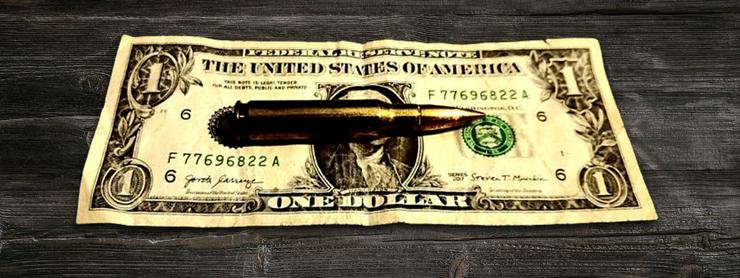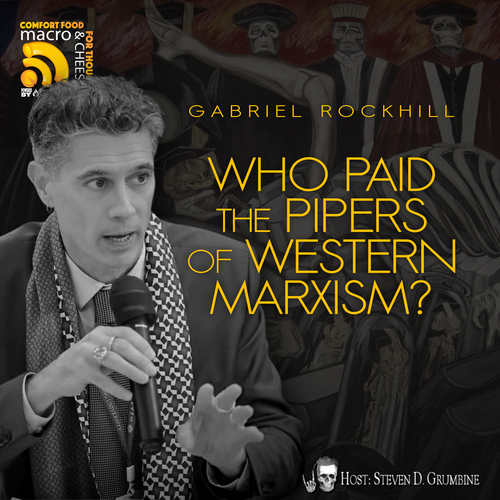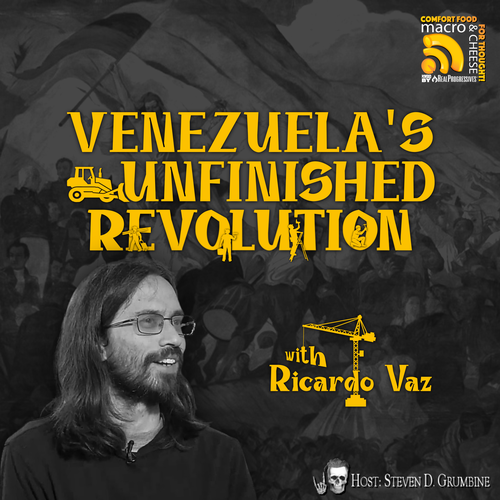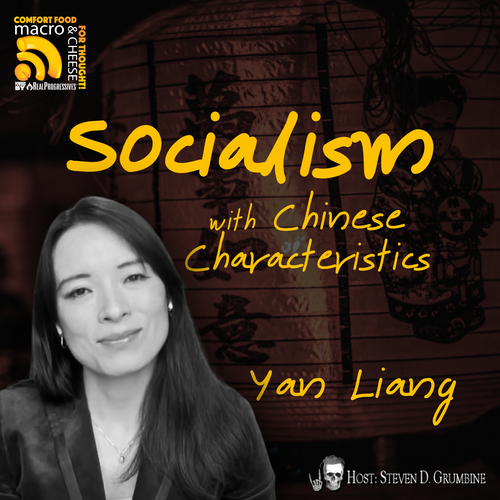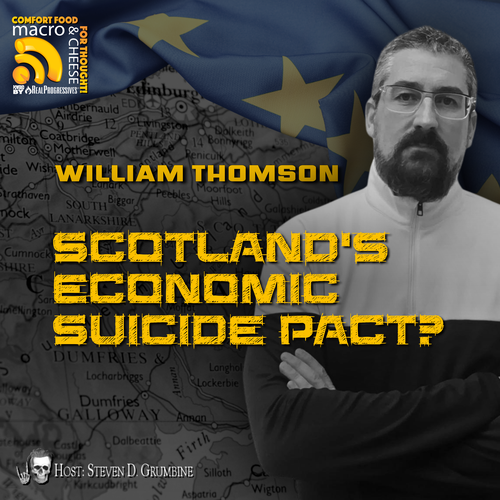Episode 250 – Dismantling Green Colonialism Part 2 with Hamza Hamouchene
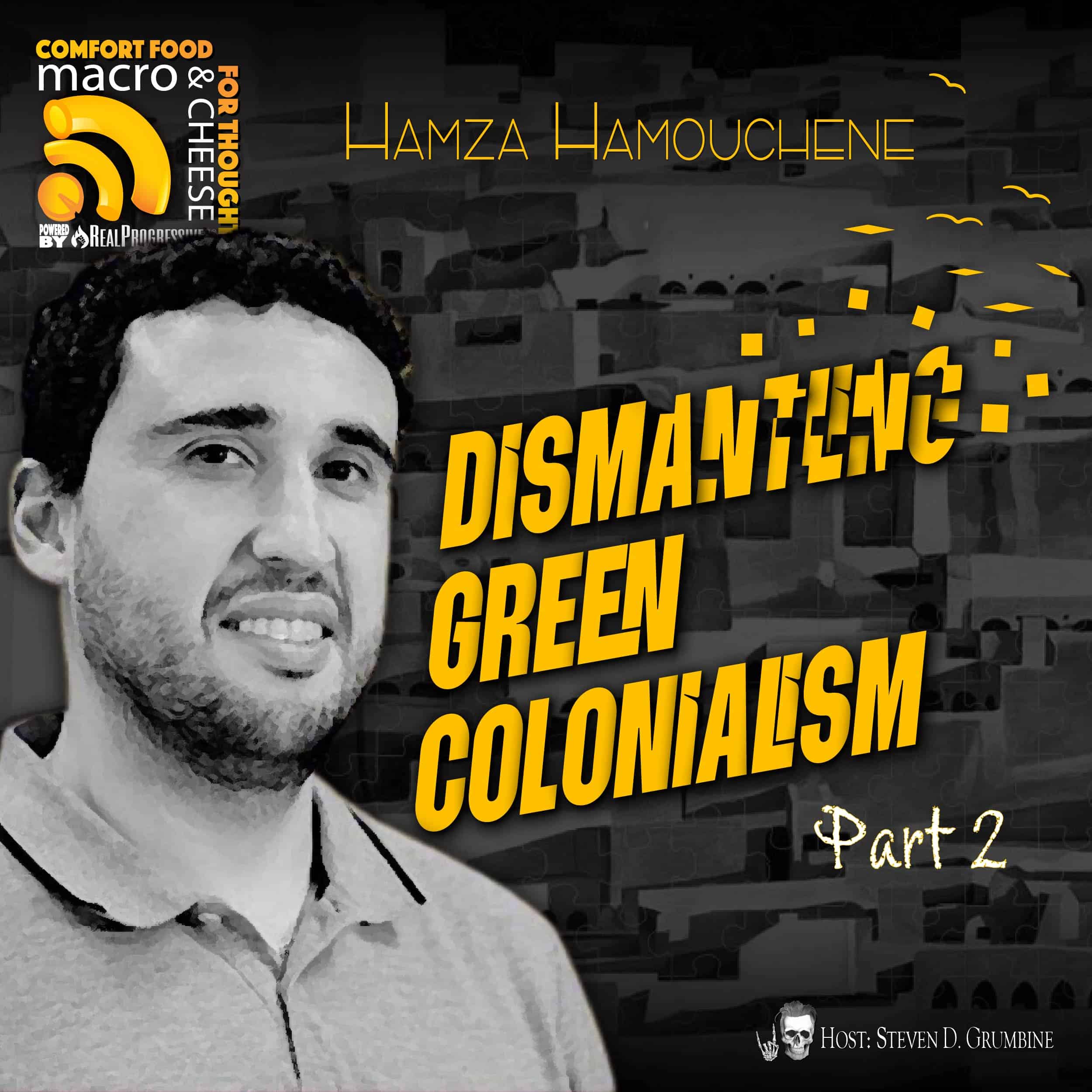
FOLLOW THE SHOW
The continuation of the interview with Dr Hamza Hamouchene about his book, Dismantling Green Colonialism: Energy and Climate Justice in the Arab Region.
**Welcome to Episode #250! This represents 250 straight weeks of work on this podcast. We couldn’t have managed without our diligent team: Steve Grumbine, host and head honcho, Andy Kennedy, audio engineer, editor and producer, Virginia Cotts, Julie Alberding, Jonathan Kadmon, Commie John Siener, and Tim O’Neill, who create show notes, art, transcripts, and a whole section of extra information and links to resources.
We have now added a bonus event, Macro ‘n Chill, a weekly Zoom meeting where the community can gather, listen, and discuss the episode. Sign up for our Substack to get event notifications.
This week’s episode is the second half of Steve’s interview with Hamza Hamouchene about his book, Dismantling Green Colonialism: Energy and Climate Justice in the Arab Region.
Steve and Hamza agree on the importance of reckoning with the realities of the current capitalist imperialist system, which has proven to be a failure in addressing the most crucial needs of people and planet. Hamza argues that alternative visions for a better world already exist – he himself is an eco-socialist – but the challenge lies in implementing them and building the necessary alliances and coalitions of working people, both at the national and global levels.
The conversation also delves into the specificities of the Arab region, which has elements of authoritarian and military dictatorships due to its subordinate insertion into the global capitalist economy and its role as a key nodal point in global fossil fuel regimes. Hamza highlights the need for a just energy transition that takes into account the control and ownership of fossil fuel resources and the potential for green renewable energies.
Hamza calls for diversifying tactics and strategies, organizing and building power to challenge imperialism and the decarbonization by dispossession.
Dr Hamza Hamouchene is a London-based Algerian researcher-activist, commentator, and a founding member of Algeria Solidarity Campaign (ASC), Environmental Justice North Africa (EJNA) and the North African Food Sovereignty Network (Siyada). He is currently the Arab region Programme Coordinator at the Transnational Institute (TNI). His work is focused on issues of extractivism, resources, land and food sovereignty as well as climate, environmental, and energy justice in the Arab region.
@BenToumert on Twitter
Macro N Cheese – Episode 250
Dismantling Green Colonialism Part 2 with Hamza Hamouchene
November 11, 2023
[00:00:00] Hamza Hamouchene [Intro/Music]: The COP process, the climate talks that have been going for 30 years now showed how it is bankrupt and failed. It’s a failure. And Greta Thunberg, the Swedish activist said 30 years of blah, blah, blah, blah. And I agree with her.
They tell you carbon trading, net zero nature based solutions, and yeah, it’s bullshit. If it worked, the carbon emissions should go down. They didn’t. So it doesn’t work.
[00:01:35] Geoff Ginter [Intro/Music]: Now, let’s see if we can avoid the apocalypse altogether. Here’s another episode of Macro N Cheese with your host, Steve Grumbine.
[00:01:43] Steven Grumbine: All right. This is Steve with Macro n Cheese. Last week, you heard the first half of my interview with Hamza Hamouchene talking about his new book, Dismantling Green Colonialism, Energy and Climate Justice in the Arab Region. Because the interview was longer than our usual episodes, we decided to bring it to you in two parts.
And I just want to point out that many podcasts divide their episodes, but they put the second half behind a paywall. We don’t do that at Macro N Cheese but we really rely on your support. To help us, please go to patreon.com/realprogressives. Here is Part Two, the continuation of Dismantling Green Colonialism with Hamza Hamouchene.
I want to add some context to this, because when we talk about the global North, and power and empire, the United States is at the top, in terms of pulling the strings: through the IMF, it has veto power, to all these different extra governmental agencies and groups that impose so much pain on the rest of the world.
That is the long arm of US imperialism. Every time I hear someone outside of the US talking about this, I feel remiss to say that the US does it to its own citizens as well. In Seattle, in San Francisco, we have the most extreme inequality. We have parking lots that have been set up for people that are making professional white collar class salaries, that have to live out of their cars. We have schools that are underfunded, and we blame the people in those communities for their lack of production in scholastic activities. We give them horrible, non-nutritious food, and we wonder why the children act out. We release them into a society that we have purposely made so brutal, and absolutely impossible to survive.
You’ve got a felony, you can no longer get a job. You have bad credit, you can no longer get a house. And this is imposed on its own citizens. This is capitalism at home in the US. Now when you say, ‘Mr. US, why don’t you care about the North African communities you’re destroying? Why don’t you care about these impoverished nations that are being crushed by your neo-colonial aspirations? Why don’t you care about us?’
And you look at how they treat their own and you have to wonder, do you really think, without a revolution of some variety, that these people in power, that have all the capital and have all the ability to use the military to destroy whatever stands in their way… do you really think they’re going to hear us without a credible threat?
And I say this because democratic institutions are laughable. In the United States, the Democratic Party fought in court, in Florida. The Democratic Party has no responsibility whatsoever to even run a primary, much less honor the results of one. And so, we mustn’t delude ourselves. We’ve got to open our eyes and see the impact of our selective silence, for the good guys of party A or party B, when in reality you have no access to them to begin with. They are doing unspeakable damage around the world.
So how, in that framework, can we ever expect the US to act on any of these things without a countervailing force? I’m hoping at some level that the BRICS Plus provides that. But I know what a military that has 900 bases around the world means. I understand what’s been done every time there’s been pushback in the Arab world. I know what’s happened in South America. I know what’s happened in Africa.
Ultimately, we’ve got to really speak truth to power. We’ve got to understand that we’re not going to vote our way out of this, that there is a serious crisis occurring. Fadhel spoke about climate migrants and climate refugees and people having to survive and leaving their homes.
And you’ve got, once again, Joe Biden pushing to build a wall, blocking off Mexico. This is what Trump pushed, and now Biden is doing the same thing. You said specifically, this book is written for activists, to do something with. Not just to read and kick their feet up and enjoy it. It’s a good book, you’ll enjoy reading it, but this is very serious reading.
Green colonialism, AKA riding on green capitalism and extractivism, isn’t going away on its own. Power gives nothing without a credible threat. What are your thoughts?
[00:06:52] Hamza Hamouchene: Very good. Very good reflection, Steve. I think there are a lot of things to unpack in what you said. And I’ll attempt to share some reflections about a way out of this multidimensional crisis of civilizations that we are going through. But I think we need to say something at the outset: finding the solutions or proposing solutions or building them, needs to come after reckoning with the reality that we are going through, even if those realities are bleak.
And this is the situation and we need to be honest and upfront, that we are going through some shit, at so many levels. The capitalist imperialist system that we are living in has proven that it’s not fit, at the political, at the social, at the health level with the pandemic, at the environmental and climate, at the food… It’s creating crisis after crisis, war after war, starvation and famine after the other. So, it is clear that this system is not working.
A lot of people before us and right now, and I’m sure in the future as well, they are thinking of alternatives and they are trying to build them. It’s not as if we don’t have ideas about the world we want. Personally, I’m an ecosocialist. I think that eco socialism is the alternative, but I don’t want to impose my view on others.
[00:08:48] Grumbine: I’m there with you.
[00:08:49] Hamouchene: Yeah. Some people choose anarcho-syndicalism. Some people tell you it’s the social solidarity economy. But I think there are some convergences that can happen, in order to build a momentum around the alternative, but to move towards, let’s say, a vision of emancipatory or liberated futures that we want.
Let’s call it, in general, like this.
To not alienate some listeners who may not be eco-socialists themselves, it’s okay. We can disagree, it’s fine. But to move there, we need a plan for that transition. We need to talk about transition politics, because change cannot happen overnight. We know that that’s what we want, but how do we get there? And what is the reality right now? What is the balance of forces?
What are our tactics and strategies? And more importantly, who are the actors that would realize or achieve that change, or implement that change or implement those strategies? What are the global alliances and the coalitions of working people, from the urban to the rural spectrum? There are a lot of working people there. The small scale farmers, the pastoralists, the unemployed, the precariat. Women collectives, street vendors, urban workers, industrial workers, academics, students, trade unionists.
So, all these people, they need to come together within that vision. Not just at the national level. Of course, it needs to start at the national level in each country. This is primordial. But then it needs to go beyond, to the regional, to the international, to the global, in order to not reproduce imperialism in other forms. That’s why we need to be internationalists. That is like, fundamental.
We need to understand what is happening in other parts of the world, and what are the impacts of our own governments, especially if they are imperialists or big empires like the United States. How do we take power? How do we build power?
These are all important questions that we need to grapple with. And the Arab region can be a site of important lessons on how to move forward in those terms, because there are some specificities in the region. Any region has its own specificities and unique features. The Arab region is one of those.
You have elements of authoritarian and military dictatorships, and this is not a natural state. This is determined by the subordinate insertion of these countries into the global capitalist economy, and the imposition of those neoliberal policies and structural adjustment programs that needed authoritarian and military dictatorships to impose. And that’s why the region has this feature of authoritarian and military dictatorship.
You have also legacies of colonialism and imperialism, ongoing legacies of colonialism and imperialism: Palestine, Western Sahara, the destruction of Iraq and Libya, the genocide and the war in Yemen. So, there are a lot of these elements in there, and at the same time, you have a huge wealth of fossil fuels, oil and gas, and a big potential for green or renewable energies.
So, how would a just energy transition look like there? What’s going to happen to the fossil fuel reserves and resources that are being exploited and extracted by national companies and foreign companies? Who’s gonna control and own the renewable energies? So, these are all fundamental questions that we need to grapple with.
I said earlier that we need to take the region seriously when we talk about that just transition, or discussions of climate justice, or the move towards renewable energy. And I’d like to emphasize why.
First of all, it is the key model points in the global fossil fuel regimes. And plays an important role in keeping fossil fuel capitalism intact by the production, the continuing production, of oil and gas.
And any look at the numbers, the statistics that we get every year from oil companies or some institutes, the region – what I mean is the Arab region, or what we call the Middle East and North Africa – remains the major axis of the global fossil fuel or hydrocarbon markets. Just in 2021, the global share of the region, in terms off oil production, is around 35%.
And if we look just a little bit back to the history, those resources have been at the heart or let’s say, at the center of that shift, that global shift from coal to oil and gas. That was in the mid 20th century, with the dominance of the United States and Saudi Arabia and Britain as well.
But more recently, especially in the last two decades, those resources are being used to feed the emergence of China and East Asia in general. Heralding a new shift in the global capitalist economy. With more intertwinement or strengthening of the relationships between the Middle East, mainly the Gulf countries, and in here, Saudi Arabia and the Emirates play a big role, with East Asia, namely China. So, any discussions around the climate crisis and the move away from fossil fuels, need to grapple with this fact.
And the key position of the region in those discussions, so we cannot ignore the region at all. It is at the heart of those discussions, and Gulf countries are going to be indisputable protagonists in those discussions. And they would constitute a big challenge. Adam Haniya’s chapter in the book, details and documents all these dynamics and challenges to the climate justice movement.
And he’s putting a warning out there. If the focus is just on the Western oil majors like BP, Shell, Totalics or Mobil and Chevron, you are missing the point. Of course you need to fight those companies, but at the same time, let’s not forget about the Gulf countries. Because their role is gonna become even more important with the escalating and deepening relationship with China, and in what he called the East-East oil axis.
And I believe this is going to be a big challenge that we need to think about as activists, as scholars in the Arab region and globally, we need to grapple with this. You mentioned something also about militarism, the securitization and the war. So the book tries to avoid framing the issues using the security lens. We would like to frame them from a justice point of view, from a just transition framework. Talking about popular sovereignty, about decolonizing, dismantling those colonial relations, challenging imperialism and accumulation by dispossession.
That’s how we want to frame the issues. The region, as you know, with all the wars in there, first of all, is a big market. I think it’s the single biggest export markets of weaponry and military hardware in the world. And it’s not just that, it is also a testing ground of new technologies. So, it is playing an important role in developing new global norms around militarism and securitization. We need to move beyond this, because a future that is subjugated to the security discourse would just empower the coercive powers of the states, and would militarize and securitize the response.
So, of course, the world is changing right now, and that’s why in the book, we say let’s not treat the region as an undifferentiated whole… ‘oh, all Arab countries are oppressed, all the communities are oppressed.’ Because it masks unevenness, and an inherent unevenness and deep inequalities in the region. For me, at least personally, I see the Gulf countries as a semi-periphery. They’re not, like, they’re not exploited as the others.
On the contrary, I see them as sub-imperialist forces. Not only are they hugely much more wealthier than their neighbors, significantly much more, but also they participate in the capture and grubbing of the surplus value at the regional level. The Gulf capital is present in most countries in the region, and dominates a lot of sectors, from construction, to logistics, to telecommunication, finance, agribusiness, and so forth.
And here, I’ll touch on the BRICS. The BRICS, let’s say it like in a brief way, the BRICS is just a reflection of the shifting dynamics of the world that we live in. Clearly, there is a waning, or let’s say ‘declining power of the conventional centers of empire’, which is people of the global north, and the emergence of new… let’s say hubs or centers of growth and accumulation.
And here we can talk about China and some of the BRICS countries, but mainly I would say Brazil and India. But is it offering an alternative? Personally, at least let’s say right now and in the short term, I don’t think so. I think it’s maintaining the same capitalistic relationships. It wants a part of the cake. But that challenge of the imperial, the global imperialist center, can create opportunities for other countries in the world. And in here, we can see the third world, even if it is a different era and a different vision, but it offered some room for maneuver, for some countries to benefit off those shifting power dynamics to play both sides.
I don’t know where the BRICS are going because right now, as it stands, it’s not a coherent project. It’s full of contradictions. You putting Saudi Arabia and Emirates, on the same side as Brazil and China. I’m… I’m not sure.
[00:21:27] Grumbine: I see your point.
[00:21:40] Intermission: You are listening to Macro N Cheese, a podcast brought to you by Real Progressives, a non profit organization dedicated to teaching the masses about MMT, or Modern Monetary Theory. Please help our efforts and become a monthly donor at PayPal or Patreon, like and follow our pages on Facebook and YouTube, and follow us on TikTok, Twitter, Twitch, Rokfin, and Instagram.
[00:22:31] Grumbine: Let’s bring this full circle to decolonization. Fadhel Kaboub, our good friend who wrote a nice comment on the back of the book, talks about how we can’t decarbonize until we decolonize. Not only in reality, but our minds as well. A lot of this is a mental frame. Help me understand, what does it look like to have a decolonized global South? To have them have self determination, to see Palestine have self determination. It benefits the people because now they have control of their lives.
But beyond that, there’s a larger economic and philosophical question. What does decolonizing and ending green colonialism mean to those regions?
[00:23:23] Hamouchene: Very good question. Very, very good question. And I think it’s important to take time to reflect about this concretely and also in abstract terms. And learn from also the experiences that history has showed us. Experiences in the region and beyond. I always go back to anti-colonial struggles in the region, and also continue to be inspired by the ongoing struggles in the region and beyond.
We’ve seen the ongoing Palestinian struggle, two waves of uprising in the region, that gave some inspiration. All this says one truth: that struggle for freedom and justice and dignity and liberation is gonna always be an ongoing process. It’s not going to just be one moment and that’s it. It’s an ongoing process.
Algeria was colonized for 132 years under brutal, racist, settler French colonialism. By the end, it gained its own independence. Is it totally liberated right now? Not really. It is run by a military dictatorship with its own contradictions, with thefts of resources, with repression and suppression.
So, what it means to me, especially in the region, I’ll focus on the region, the question of national liberation, when agrarian reform and recovery of land and resources, which means popular, national and popular sovereignty of land and natural resources, is primordial. But it’s not enough.
National liberation on its own, as my mentor Frantz Fanon has said, national consciousness is important. You fight the colonizers, but that’s not enough. That national consciousness needs to develop into a social consciousness, which brings here the question of class. Class and race and gender and other elements.
These need to be at the center. And you were talking about the inequalities and the poverty. In the center, at the heart of empire, imagine in the United States, here in the UK as well, there is poverty, huge inequality, people are not living decent livelihoods. Some people have one meal a day. Young children go without having a meal. In the UK, one of the most advanced countries.
So that’s why those struggles that we are fighting for, they need to converge. We need to fight for equality and justice everywhere, democratize at the same time. And this is going to be really challenging. And we’ve seen it. We’ve seen it through the experiences of the Algerian liberation struggle, of the Palestinian struggle.
The Palestinians have been going for more than 75 years, eight decades, fighting to have a land. But I hope that day will come, and I’m sure it will, I don’t know if it’s going to be in my lifetime, but it will come. But it’s not going to be enough. The same thing for Western Sahara, because you need to fight for a system without class oppression, without gender oppression, without racist oppression. And this is going to be an ongoing process. For me, in concrete terms, the things that can be done, and there are a lot of examples that the Arab region could be learning from, is what is happening right now, in terms of ownership and control of what we call ‘critical raw materials.’ Critical raw materials that are needed for the transition, to build electrical batteries, to build the wind turbines, the solar panels and so forth, like lithium, nickel, cobalt, graphite, copper.
So, all these elements are needed in there. So, some countries like Zambia, Indonesia, Chile, are trying. Some of them have banned the export of those materials in the raw form. They’re saying, okay so there is a global need for these critical raw materials, especially that the global North and China needs them.
Why would I continue exporting low value, cheap raw materials? Processing and industrializations need to happen in my country. And I would support this, because that’s how you move up the value chain. That’s how you start challenging imperialism. That’s how you de-link from the imperialist/capitalist system. By challenging those logics imposed on you.
They’re telling you, no, you need to specialize in producing those products, and I’ll process them and industrialize and have the technology. No, some of those countries are challenging this rationale. They say, no, we need industrialization in order to create real jobs. And hopefully those extractive industries, at least it will be regulated to minimize the environmental damage.
That is important to include this in our discussions, but I feel this is what needs to be done. But what we are seeing right now in Morocco, in Tunisia, is just export oriented projects. Using the land, the water, the resources, the cheap labor… well, let’s say not just cheap, the cheapened and then disciplined labor… in order to export that cheap energy while monopolizing and dominating the technologies and the value chains.
And I can go on and go on. Namibia, for example… Namibia signed a big deal with the ex-colonial power, Germany. That’s why we need to continue talking about colonialism. And I’ll tell you why.
So, you look at the deal, and it’s a big green hydrogen project. So, they’re going to build big solar plants and wind farms, as I explained before, to produce green hydrogen for export. And I think most of it would go to Germany. The project is controlled by German and British companies. And what it says, Namibian government is only entitled to 24% of the share, just 24%. And it needs to buy it, like, it needs to put money to buy that 24% share.
Actually, the Namibian government is contracting loans in order to finance that 24%, or maybe less. It’s gonna be less. That’s one. Second, Namibia, 50% of the population does not have electricity. 50% of the population does not have electricity and it gets most of its electricity from South Africa, so it imports its electricity.
So, let’s just go back to the process of how green hydrogen is being produced. So, they’re gonna build solar plants and wind farms. They’re gonna produce green electricity. Instead of using that green electricity, to provide their own populations, to give them decent, cheap, affordable green electricity. To achieve some kind of self sufficiency in the electricity and energy production. What they want to do with this project, is use it to produce green hydrogen for export.
Does that make sense to you, Steve?
[00:32:19] Grumbine: Not at all. We spoke to Ndongo Samba Sylla recently, who talked about how these arrangements are set up to send the raw materials to be produced, then they have to buy back their own stuff. And all the extraction of the profits, the surplus value, goes to the corporations outside of the country. That none of the benefit is kept locally.
This is insane.
[00:32:47] Hamouchene: That’s what we talk about decolonization. I agree with Fadhel. You cannot decarbonize without decolonizing the systems: without having food, energy, and land sovereignty, without trying to industrialize and move up the value chain, without radically transforming your economies. But this can’t happen overnight.
This needs building power, building the alliances between working people. And moving towards that direction, converging the struggles and building the intersections between food sovereignty, climate justice, social justice, workers rights, women’s rights, minorities rights, and democratize. And that takes ongoing struggles.
And that’s what we’ve seen. It’s not easy because the empire will come down on you. They wouldn’t accept. They would use all the tools that they have, first of all, to sue you into international courts, if you dare to use your own resources to industrialize.
And actually, that’s what the EU has done with Indonesia in the World Trade Organization. They are trying to sue them there. They said, ‘no, you cannot send us the raw material.’ Imagine. So that’s why the trade architecture needs to be changed. This is a colossal task for humanity, and it cannot just be done by some people in one country. It should be done by people in the U.S., by people in Algeria, people in India. People who embrace the vision of emancipatory futures, of eco-socialism, of just transition, of global justice.
I think it’s going to be a long term process. I believe it is needed, because right now we are going into the abyss with the escalating climate crisis. And we are seeing how the forces of empire do not give a shit about people. They are launching war after war. War in Ukraine, war in Palestine. They are abetting and supporting populist, fascist, and genocidal regimes everywhere.
They are continuing the same patterns of dispossession and plunder and calling them ‘green capitalism’ and ‘sustainable development.’ And that’s what the book is trying to challenge and to ‘say, look, guys, this is happening in the Arab region, and it’s also happening in some other parts of the world. You need to take stock of that, so those dynamics are not reproduced in your areas.’
And they can happen in the north or in the south. It can happen in the US, in the land of indigenous communities, or in the areas where black and brown and white working people live. That’s what it tends to do. That’s why the just transition needs to be a class issue. It is a gender issue. It is a race issue. It is a decolonial issue, but it’s also about democratization. So we cannot forget that fact, especially in a region that is run by authoritarian and military dictatorships.
The COP process, the climate talks that have been going for 30 years now, showed how it is bankrupt and, and failed. It’s a failure.
And Greta Thunberg, the Swedish activist said 30 years of blah, blah, blah, blah. And I agree with her because first of all, it has been hijacked by corporate and private interests. The fossil fuel industry is huge there, it’s sending all its lobbyists… and they are promoting the false solutions.
They tell you carbon trading, net zero, nature based solutions, and yeah, it’s bullshit. If it worked, if it worked, the carbon emissions should go down. They didn’t. So it doesn’t work. I think that’s clear. Those solutions do not work. Those false solutions are not just put forward by Western companies. Right now you have Emirati companies.
There is an Emirati company called Blue Carbon, championing some conservation projects and carbon trade or carbon offsets. That’s how they call them. Basically, pollution permits set in pollution permits. So it has big projects. It acquired huge swaths of land. In Liberia and Zimbabwe, Zimbabwe, 20 percent of the surface of Zimbabwe, 10 percent of the surface of Liberia, and they tell you, ‘we’re going to conserve those forests and we’re going to displace indigenous communities and they’re going to sell and make money.’
We need to challenge this. Some people do not know about it. So, this is the job of scholars and activists to connect the dots. To say this needs to be challenged, we need to build power against these things, against these false solutions. We need to diversify our tactics and strategy. Some people would continue to go into the COP and make noise.
Some people try to organize outside and I think we have no choice. We need to continue to organize, organize and organize. And that’s what I believe. And that’s what keeps me going, Steve. Because there is a lot of despair around us.
[00:38:34] Grumbine: Absolutely. One of the most important things that we can do right now, is educate one another. Is to provide information and to share information. Social media, which had previously been such a tremendous path to share mass information, has now been stifled to the point where it requires a concerted effort to get your message out there.
I hope folks take this podcast, share it around. On our website, when you open up this podcast, there’s a transcript and extras that will tie in the links and the various things that you’ve heard Hamza speak to in this conversation, we do it every episode. So please use this as a tool. This is our effort to provide information.
So please help us share this around. Hamza. Your final thoughts.
[00:39:29] Hamouchene: I think I would, first of all, thank you Steve, for inviting me and giving me the opportunity to share those reflections. I think it has been a fascinating discussion. And as I said, the book is a tool for activists, scholars, students… who care about social, environmental, and climate justice in the world. To deepen the discussions around those questions, and to ask the right questions.
Who owns what, who does what, who wins, who loses. And we need to ask ‘energy for what and for whom, and who controls it and who owns it.’ And it’s not about asking those questions for the sake of writing articles or academic papers.
No, it’s about analyzing the dynamics of capital and imperialism, and how it works, in order to build a better world. Uncover its deceptions under the guise of the green economy and the sustainable development paradigm. And challenge those neoliberal and neocolonial agendas. And try to build the alliances.
That’s important. We need to build the alliances. And that’s a messy and difficult and challenging task, is building our movements to take power, to challenge capital accumulation, to challenge the decarbonization by dispossession, to challenge dispossession to occur.
And I think these are the elements that the book is trying to push forward. Let’s cut through the mainstream bullshit and the liberal discourse about human rights and inclusivity, that showed its bankruptcy in the Palestinian cause.
Western powers are calling, basically abetting and supporting, genocide. And I think Palestine always, it’s dominated my life right now. So, I cannot think of anything without thinking about the plight of Palestinians, children, women, and men, and elderly who are suffering under the Israeli genocidal campaign.
So, my thought and my solidarity to them, and to all the activists and the defenders of human rights, true human rights, and environmental and social justice in the world.
Like in my home country, Algeria, I have a friend who is an environmental defender who participated in the latest uprising in Algeria in 2019, and he lies in the jails of the Algerian military dictatorship.
So, it’s about how do we connect those struggles. And for me, they are connected. You need to fight at several fronts with others. Don’t think individually. Think collectively. Join organizations around you. Try to strengthen them. Point out some of the blind spots. And then, let’s avoid sectarianism. Let’s avoid polemics. Because it’s divisive. It fragments our movement. Let’s not lecture others of how to be much more radical.
And I’m tired of the discussion Steve, you know? But for now, you can purchase the book at Pluto’s website. It’s on a 30% discount, using the code GREEN30. I hope you will enjoy it. I hope you will find it an interesting read, and find some inspiration for your ongoing struggles. And thanks a lot.
[00:43:26] Grumbine: Thank you so much Hamza.
All right. We are a public nonprofit 501c3. We survive by your donations. Please donate to the cause if you can at our Patreon account, that would be patreon.com/realprogressives. And Hamza, thank you once again, for being such a wonderful guest. And I look forward to having you at a future RP Live.
And hopefully, we can do a book club with all of our volunteers and our supporters out there, so we can get this information out far and wide. So, thank you so much for being with me today, sir.
[00:44:00] Hamouchene: We will do. We will do Steve.
Thanks a lot. And this is, I think, a great podcast and fascinating discussion. Thanks a lot.
[00:44:08] Grumbine: Fantastic. My name’s Steve Grumbine. This is Macro N Cheese and we are outta here.
[00:44:19] End Credits: Macro N Cheese is produced by Andy Kennedy. Descriptive writing by Virginia Cotts and promotional artwork by Andy Kennedy. Macro N Cheese is publicly funded by our Real Progressives Patreon account. If you would like to donate to Macro N Cheese, please visit patreon.com/realprogressives.
“Imperialism is a system of exploitation that occurs not only in the brutal form of those who come with guns to conquer territory. Imperialism often occurs in more subtle forms, a loan, food aid, blackmail.”
~Thomas Sankara
GUEST BIO
Dr Hamza Hamouchene is a London-based Algerian researcher-activist, commentator and a founding member of Algeria Solidarity Campaign (ASC), Environmental Justice North Africa (EJNA) and the North African Food Sovereignty Network (Siyada). He is currently the Arab region Programme Coordinator at the Transnational Institute (TNI). His work is focused on issues of extractivism, resources, land and food sovereignty as well as climate, environmental, and energy justice in the Arab region. He is the author/editor of four books: “Old Wells and the new colonialism: the challenges of climate change and a just transition in North Africa” (2022), “The Arab Uprisings: A decade of struggles” (2022), “The Struggle for Energy Democracy in the Maghreb” (2017) and The Coming Revolution to North Africa: The Struggle for Climate Justice (2015). He also contributed chapters to various books including “The Oxford Handbook of Economic Imperialism” (2022), “The Routledge Essential Guide to Critical Development Studies” (2021), “Fanon Today: Reason and Revolt of the Wretched of the Earth” (2021), “A Region in Revolt: Mapping the Recent Uprisings in North Africa and West Asia” (2020), “The Palgrave Encyclopaedia of Imperialism and Anti-Imperialism” (2016) and “Voices of Liberation: Frantz Fanon” (2014). His other writings have appeared in Africa Is A Country, the Guardian, Middle East Eye, Counterpunch, New Internationalist, Jadaliyya, openDemocracy, ROAR magazine, Pambazuka, Nawaat, El Watan and the Huffington Post.
https://www.tni.org/en/profile/hamza-hamouchene
Dr Hamouchene’s Twitter is @BenToumert
PEOPLE MENTIONED
Muammar al-Qaddafi
was the de facto leader of Libya from 1969 until 2011 when he was ousted by a revolt and eventually killed by rebel forces in October of 2011.
https://www.britannica.com/biography/Muammar-al-Qaddafi
Adam Hanieh
is a Professor of Political Economy and Global Development at IAIS, University of Exeter, and Joint Chair at the Institute of International and Area Studies (IIAS) at Tsinghua University, Beijing, China. His research focuses on the political economy of the Middle East, with a particular emphasis on the six states of the Gulf Cooperation Council and examines the role of the Gulf states within global capitalism. https://arabislamicstudies.exeter.ac.uk/staff/hanieh/
Fadhel Kaboub
is an Associate Professor of economics at Denison University, the President of the Global Institute for Sustainable Prosperity, and is currently working with Power Shift Africa in Nairobi, Kenya.
Before settling at Denison in 2008, Dr. Kaboub taught at Simon’s Rock College of Bard and at Drew University where he also directed the Wall Street Semester Program. He has held research affiliations with the Levy Economics Institute, the Economic Research Forum in Egypt, the John F. Kennedy School of Government at Harvard University, and the Center for Full Employment and Price Stability at the University of Missouri, Kansas City (UMKC).
Franz Fanon
was a 20th century psychiatrist, political philosopher, and Marxist from the French colony of Martinique. His works have become influential in the fields of post-colonial studies, critical theory, and Marxism.
https://en.m.wikipedia.org/wiki/Frantz_Fanon
https://plato.stanford.edu/entries/frantz-fanon/
Ndongo Samba Sylla
is a Senegalese development economist. He has previously worked as a technical advisor at the Presidency of the Republic of Senegal and is Programme manager at the West Africa office of the Rosa Luxemburg Foundation. His interests include Fair Trade, labor markets, democratic theory and monetary sovereignty. He holds a PhD. from the University of Versailles (UVSQ).
https://bookshop.org/search?keywords=Ndongo+samba+sylla
Greta Thunberg
is a Swedish environmental activist known for challenging world leaders to take immediate action for climate change mitigation.
https://www.bbc.com/news/world-europe-49918719
“I think Palestine always. It’s dominating my life right now. So, I cannot think of anything without thinking about the plight of Palestinians: children, women and men and elderly who are suffering under the Israeli genocidal campaign. So, my thoughts and my solidarity are to them and to all the activists and the defenders of human rights, through human rights and environmental and social justice in the world.”
~Hamza Hamouchene, Macro N Cheese Episode 249, “Dismantling Green Colonialism”
INSTITUTIONS / ORGANIZATIONS
European Union (EU)
The evolution of what is today the European Union (EU) from a regional economic agreement among six neighboring states in 1951 to today’s hybrid intergovernmental and supranational organization of 27 countries across the European continent stands as an unprecedented phenomenon in the annals of history.
https://www.cia.gov/the-world-factbook/countries/european-union/
https://european-union.europa.eu/index_en
Intergovernmental Panel on Climate Change (IPCC)
is the United Nations body for assessing the science related to climate change.
World Bank
is an international financial institution that provides loans and grants to the governments of low- and middle-income countries for the purpose of pursuing capital projects. The world bank operates on a sectorial basis while the IMF concerns itself with macro goals.
https://en.wikipedia.org/wiki/World_Bank
International Monetary Fund (IMF)
is a major financial agency of the United Nations, and an international financial institution claiming it’s mission to be “working to foster global monetary cooperation, secure financial stability, facilitate international trade, promote high employment and sustainable economic growth, and reduce poverty around the world.” The IMF concerns itself with macro goals, while the World Bank operates on a sectorial basis.
https://en.m.wikipedia.org/wiki/International_Monetary_Fund
African Development Bank
Founded in 1964 by the Organization of African Unity (predecessor of the African Union), AfDB is a multilateral development finance institution headquartered in Ivory Coast providing financial services to African governments and private entities investing in the region.
BRICS
The acronym began as a somewhat optimistic term to describe what were the world’s fastest-growing economies at the time. But now the BRICS nations — Brazil, Russia, India, China, South Africa — are setting themselves up as an alternative to existing international financial and political forums.
https://www.dw.com/en/a-new-world-order-brics-nations-offer-alternative-to-west/a-65124269
https://www.silkroadbriefing.com/news/2023/03/27/the-brics-has-overtaken-the-g7-in-global-gdp/
Pluto Press
Established in 1969, Pluto Press is an independent publisher of radical, left‐wing non‐fiction books.
EVENTS
Energy Charter Treaty
provides a multilateral framework for energy cooperation and is designed to promote energy security through the operation of more open and competitive energy markets, while respecting the principles of sustainable development and sovereignty over energy resources. Signed in December 1994 and entered into legal force in April 1998 the treaty currently includes fifty-three signatories and contracting parties from Europe and Asia.
https://www.energycharter.org/process/energy-charter-treaty-1994/energy-charter-treaty/
“Are we doing anything to mitigate the impact of climate change, to allow people and communities to adapt to these changes so that we can treat people with dignity? The answer is no, we’re just pretending like we’re doing climate action. And when we hear somebody like John Kerry, the US climate envoy saying we will not pay for climate reparations, and when we see the only solutions presented to us are literally tranquilizing drugs of gradualism on a small scale, actually, then it becomes our responsibility as people, as civil society all over the world, not just in the Global South, to call it out.”
~Fadhel Kaboub, Macro N Cheese Episode 245, “Decolonizing Our Minds”
CONCEPTS
Apartheid
The term “apartheid” was originally used to refer to a political system in South Africa which explicitly enforced racial segregation, and the domination and oppression of one racial group by another. It has since been adopted by the international community to condemn and criminalize such systems and practices wherever they occur in the world.
https://www.amnesty.org/en/latest/campaigns/2022/02/israels-system-of-apartheid/
Monetary Sovereignty Within Developing/Emerging Nations
Today, the concept of monetary sovereignty is typically used in a Westphalian sense to denote the ability of states to issue and regulate their own currency. This understanding continues to be the default use of the term by central bankers and economists and in fields ranging from modern monetary theory to international political economy and international monetary law. As we argue in this article, the Westphalian conception of monetary sovereignty rests on an outdated understanding of the global monetary system and the position of states in it. This makes it unsuitable for the realities of financial globalization.
Climate Change Solutions Through the MMT Lens
Governments with currency issuing powers already have a unique capacity to command and shape the profile of how national resources are used and allocated. This would be achievable through a combination of fiscal deficit investment in green technology alongside a more stringent legislative and tax framework to drive the vital behavioral change essential to addressing the life-threatening effects of climate change. In this way, and by moving the emphasis away from excessive consumption and its detrimental effects on the environment, governments could focus on the delivery of public and social purpose with more appropriate, fairer and efficient use of land, food and human capital in a sustainable way. The implementation of a Job Guarantee Program could also play a pivotal role in reshaping our economy and making the necessary shift towards a greener and more sustainable future.
https://gimms.org.uk/2018/10/13/the-economics-of-climate-change/
The Global South
refers broadly to regions of Latin America, Asia, Africa, and Oceania. It is one of a family of terms, including “Third World” and “Periphery,” that denote regions outside Europe and North America, mostly (though not all) low-income and often politically or culturally marginalized. The use of the phrase Global South marks a shift from a central focus on development or cultural difference toward an emphasis on geopolitical relations of power.
https://journals.sagepub.com/doi/pdf/10.1177/1536504212436479
Eco-socialism
or green socialism, socialist ecology, ecological materialism, or revolutionary ecology, is an ideology merging aspects of socialism with that of green politics, ecology and alter-globalization or anti-globalization. Eco-socialists generally believe that the expansion of the capitalist system is the cause of social exclusion, poverty, war and environmental degradation through globalization and imperialism, under the supervision of repressive states and transnational structures.
https://en.m.wikipedia.org/wiki/Eco-socialism
Green Growth
is a concept in economic theory and policymaking used to describe paths of economic growth that are environmentally sustainable.
https://en.wikipedia.org/wiki/Green_growth
Degrowth
is a term used for both a political, economic, and social movement as well as a set of theories that criticizes the paradigm of economic growth. Degrowth is based on ideas from political ecology, ecological economics, feminist political ecology, and environmental justice, arguing that social and ecological harm is caused by the pursuit of infinite growth and Western “development” imperatives.
https://en.wikipedia.org/wiki/Degrowth
https://degrowth.info/degrowth
Neocolonialism
is the continuation or reimposition of imperialist rule by a state (usually, a former colonial power) over another nominally independent state (usually, a former colony).
https://en.wikipedia.org/wiki/Neocolonialism
Imperialism
is a state policy, practice, or advocacy of extending power and dominion, especially by direct territorial acquisition or by gaining political and economic control of other areas. Because it always involves the use of power, whether military or economic or some subtler form, imperialism has often been considered morally reprehensible.
https://www.britannica.com/topic/imperialism
Green Imperialism
also called eco-imperialism, eco-colonialism, or environmental imperialism, is a derogatory epithet alluding to what is perceived as a Western strategy to influence the internal affairs of mostly developing nations in the name of environmentalism.
https://en.wikipedia.org/wiki/Green_imperialism
Modern Monetary Theory (MMT)
is a heterodox macroeconomic supposition that asserts that monetarily sovereign countries (such as the U.S., U.K., Japan, and Canada) which spend, tax, and borrow in a fiat currency that they fully control, are not operationally constrained by revenues when it comes to federal government spending.
Put simply, modern monetary theory decrees that such governments do not rely on taxes or borrowing for spending since they can issue as much money as they need and are the monopoly issuers of that currency. Since their budgets aren’t like a regular household’s, their policies should not be shaped by fears of a rising national debt, but rather by price inflation.
https://www.investopedia.com/modern-monetary-theory-mmt-4588060
https://gimms.org.uk/fact-sheets/macroeconomics/
Capital Order
Clara Mattei, in her book The Capital Order, asserts the primacy of capital over labor in the hierarchy of social relations within the capitalist production process. That primacy was threatened after World War I in what she describes as the greatest crisis in the history of capitalism. Among the concepts the author discusses is a so called “Trinity of Austerity” through which the Capital Order asserts dominance over labor by the combination of Monetary (interest rate increase), Fiscal (reductions in spending for social need), and Industrial (layoff, wage/work hours reduction) Austerity with the desired, yet implicit, intention of increasing tension, and therefore pliability, among the working classes.
Just Transition
is a principle, a process and a practice. The principle of just transition is that a healthy economy and a clean environment can and should co-exist. The process for achieving this vision should be a fair one that should not cost workers or community residents their health, environment, jobs, or economic assets.
Greenwashing
is the act of making false or misleading statements about the environmental benefits of a product or practice.
https://www.nrdc.org/stories/what-greenwashing
Orientalism
is the imitation or depiction of aspects of the Eastern world by writers, designers, and artists from the Western world.
https://en.wikipedia.org/wiki/Orientalism
Social and Solidarity Economy (SSE)
refers to forms of economic activities and relations that prioritize social and often environmental objectives over profit motives.
https://www.un.org/sites/un2.un.org/files/social_and_solidarity_economy_29_march_2023.pdf
Internationalism
is a political principle that advocates greater political or economic cooperation among states and nations.
https://en.m.wikipedia.org/wiki/Internationalism_(politics)
“…you have a party that’s saying we’re gonna choose our standard bearer, and we’re gonna follow these general rules of the road, which we are voluntarily deciding, we could have voluntarily decided that we’re gonna go into back rooms like they used to and smoke cigars and pick the candidate that way. That’s not the way it was done. But they could have, and that would have also been their right.”
~Bruce V Spiva, Attorney for the DNC, Wilding vs DNC Services Corporation
https://www.nakedcapitalism.com/2018/01/democratic-party-wilding-et-al-v-
https://caselaw.findlaw.com/court/us-11th-circuit/2028824.html
PUBLICATIONS
Dismantling Green Colonialism: Energy and Climate Justice in the Arab Region by Hamza Hamouchene
Related Podcast Episodes
Related Articles
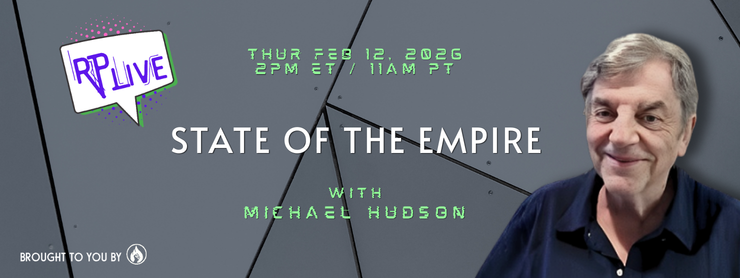
RP Live! State of the Empire
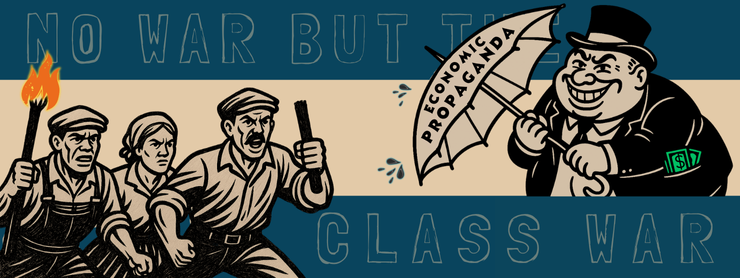
How the Elites Weaponize the Economic Illiteracy of the Working Class
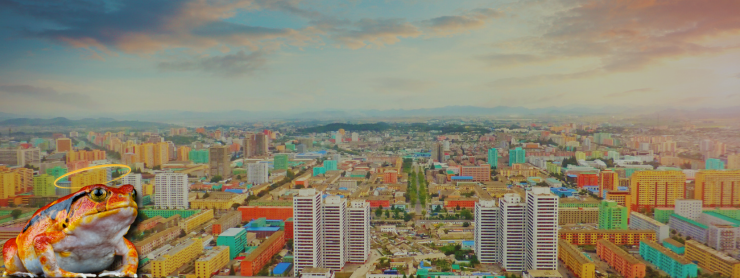
All Frogs Go To Heaven
